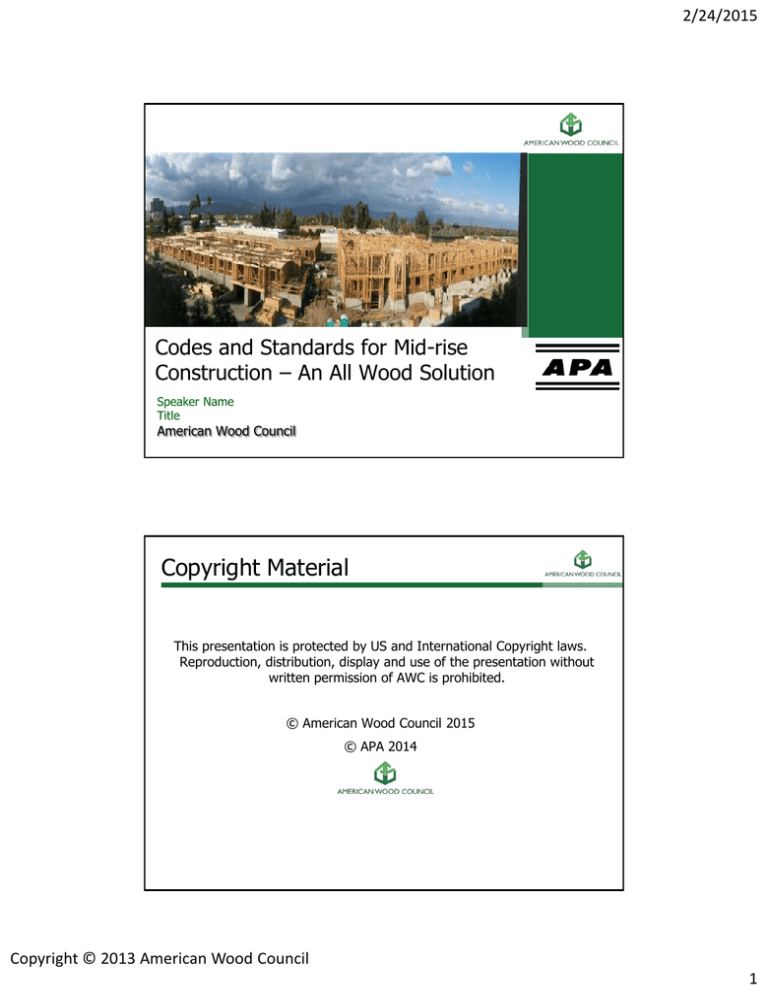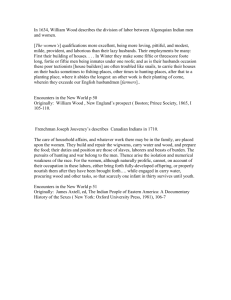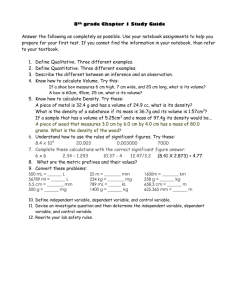
2/24/2015
Codes and Standards for Mid-rise
Construction – An All Wood Solution
Speaker Name
Title
American Wood Council
Copyright Material
This presentation is protected by US and International Copyright laws.
Reproduction, distribution, display and use of the presentation without
written permission of AWC is prohibited.
© American Wood Council 2015
© APA 2014
Copyright © 2013 American Wood Council
1
2/24/2015
Description
Mid-rise construction, with multiple stories of wood framing
over a concrete first story, has been popular for many years as
a way to take advantage of wood's cost effectiveness for the
superstructure while maintaining a more traditional
construction type below. Recently, some designers have chosen
to forego concrete altogether and build the entire structure in
wood, including the transfer floor framing level between R-2
and S-2 occupancies—further decreasing their costs while
speeding construction and creating less massive, more uniform
buildings. This course will examine two very different
projects, a luxury apartment complex and a senior housing/mixed
use project. Design considerations for durability, fire
protection, sound transmission, seismic loads, and other
provisions in the International Building Code (IBC) and the AWC
Special Design Provisions for Wind and Seismic (AWC-SDPWS) will
be addressed.
Learning Objectives
• At the end of this program, participants will:
1. Understand the opportunities and challenges for wood use in
mid-rise construction and be able to use that knowledge to
specify this type of system in the future.
2. Learn the motivational drivers associated with the use of
wood for midrise construction and why to consider it on
future projects vs. typically specified systems.
3. Discover the structural challenges associated with transfer
floor framing (level between R-2 and S-2) and gain a better
understanding of the collaboration necessary with the
structural engineer.
4. Understand how a transfer floor framing (level between R-2
and S-2) is designed for durability and longevity using nontraditional systems and methods.
Copyright © 2013 American Wood Council
2
2/24/2015
Outline
•
SEAOC
•
http://seaoc.org/bookstore/
proceedings-81st-annual2012-santa-fe
Outline
•
Podium Construction Defined
•
Project Overviews
•
Design Challenges and Solutions
•
Features and Benefits
Copyright © 2013 American Wood Council
3
2/24/2015
Podium Construction Defined
• Traditional Podium Construction
•
All wood Construction
Residential + Nonresidential wood
construction
Podium Construction Defined
Residential + Nonresidential
concrete podium (transfer slab)
Residential + Nonresidential wood
transfer floor
Copyright © 2013 American Wood Council
4
2/24/2015
History
2-story wood office building over subterranean p
arking
Outline
•
Podium Construction Defined
•
Project Overviews
•
Design Challenges and Solutions
•
Features and Benefits
Copyright © 2013 American Wood Council
5
2/24/2015
Project Overview
• Oceano at Warner Center:
• Luxury apartments, 244 units
• 4 stories above grade, one
story below, 55’
• Galt Place:
• Affordable seniors’ housing, 88
units
• 3 stories, 47’
• 2008 LABC based on 2007 CBC • 2007 CBC based on 2006 IBC
based on 2006 IBC
Project Overview-Oceano at Warner Center
Project Team:
•
•
•
•
Owner: TDI California Construction & Oceano Partners
•
General Contractor: TDI California Construction
•
Architect: RC Alley III, NCARB, Architects Orange
•
Structural Engineer: Tom VanDorpe, SE, VanDorpe Chou Associates,
Inc. (VCA)
•
Framer: Brian Larrabure, Larrabure Framing
Construction Timeline:
January 2011 to occupancy in July 2012
Copyright © 2013 American Wood Council
6
2/24/2015
Project Overview-Oceano at Warner Center
• Construction Type: VA
• Occupancies:
• Below Grade: S-2 Enclosed semisubterranean parking below grade
• Levels 1-4: R-2 Building 1 – 116
units (146,847 sf) and Building 2 –
128 units (163,468 sf)
R-2
R-2
R-2
Approx. 55’
•Architectural Components:
R-2
S-2 Enclosed
• Sprinklers: NFPA 13 sprinkler system.
Project Overview-Oceano at Warner Center
Copyright © 2013 American Wood Council
7
2/24/2015
Project Overview – Galt
• Project Team:
• Owner: City of Galt and CFY Development Inc.
• General Contractor: CFY Development Inc.
• Architect: Michael F. Malinowski, AIA, Applied Architecture Inc.
• Structural Engineer: Mike Baker, SE, Baker Guptil Structural Designs,
Inc.
• Framer: Becker General Contractors
• Construction Timeline:
• March 2011 to occupancy in June 2012
Project Overview – Galt
•
Construction Type: VA
•
Areas & Occupancies:
•
•
•
Level 1: S-2 (24,633 sf) Enclosed, A2,
M and B– Retail/Restaurant/Office and
Residential Administration (14,356 sf)
R-2
R-2
S-2 Enclosed,
A2, M & B
Approx. 47’
•Architectural Components:
Levels 2 and 3: R-2– 88 Units (62,480
sf)
Sprinklers: NFPA 13 sprinkler system.
Copyright © 2013 American Wood Council
8
2/24/2015
Project Overview – Galt
Structural Components
• Structural Specifications
• Light-framed shear walls all levels
• Wood Transfer Floor: Engineered Wood System
• Wood Structural Panels with gypcrete topping
• I-joists
• Glued laminated Beams (Glulams)
Copyright © 2013 American Wood Council
9
2/24/2015
Structural Components
• Engineered Wood System
• Wood Structural Panels
• Oriented Strand Board (OSB)
• Plywood for balconies
• I-joists and Sawn Lumber
Structural Components
• Light-framed shear walls
• Superstructure
• Shear wall design
methods
• Architectural
Gingerbread
Copyright © 2013 American Wood Council
10
2/24/2015
Structural Components
• Light-framed shear walls
• Wood Transfer Floor
• Focus on Continuity
• Detailing
Structural Components
• Glulam Beams
• 2 Stress Classes
• Bending Stress, Modulus of
Elasticity
• 24F-1.8E (2400 psi, 1.8x106
psi)
• 30F-2.1E (3000 psi, 2.1x106
psi)
• Variety Sizes
• 5-1/8 inches to 12-1/4 inches
wide
• 10-3/4 inches to 45 inches
deep
LVL Laminations
Copyright © 2013 American Wood Council
11
2/24/2015
Structural Components
•Structural Steel
•
Steel Columns & Connections
•
Price Steel Beams > Glulams
Outline
•
Podium Construction Defined
•
Project Overviews
•
Design Challenges and Solutions
•
Features and Benefits
Copyright © 2013 American Wood Council
12
2/24/2015
Design Challenges and Solutions
Governing Codes
for Engineered
Wood Design
Design Challenges and Solutions
2007 California Building Code (CBC)
Copyright © 2013 American Wood Council
13
2/24/2015
Design Challenges and Solutions
2008 City of Los
Angeles Building
Code
Design Challenges and Solutions
2010 California Building Code (CBC)
Copyright © 2013 American Wood Council
14
2/24/2015
Design Challenges and Solutions
Heights and Areas
•
What
•
•
•
•
•
•
factors into determining allowable heights and areas?
Occupancy
Construction Types
Protected or Unprotected
Open Frontage
Sprinklers
Fire Walls/Barriers
Design Challenges and Solutions
Copyright © 2013 American Wood Council
15
2/24/2015
Design Challenges and Solutions
IBC 2009 Special Provisions – 509
509.1 General. The provisions in this section shall permit the
use of special conditions that are exempt from, or modify, the
specific requirements of this chapter regarding the allowable
heights and areas of buildings based on the occupancy
classification and type of construction, provided the special
condition complies with the provisions specified in this section
for such condition and other applicable requirements of this
code. The provisions of Sections 509.2 through 509.8 are to be
considered independent and separate from each other.
Design Challenges and Solutions
IBC 2009 Special Provisions – 509
•
•
509.2 Horizontal building separation allowance.
considered separate buildings above and below
for purposes of area calculations if:
• 3hr horizontal assembly
• one story above grade of Type 1A with
sprinklers below separation
• occupancy above is A, B, M, R or S
• occupancy below is A, B, M, R or S-2
• overall height is still limited
Copyright © 2013 American Wood Council
16
2/24/2015
Design Challenges and Solutions
IBC 2009 Special Provisions – 509
•
•
509.4 Parking beneath Group R.
Possibility of a Type IV podium where number of stories starts
above parking:
• 1 hr horizontal assembly
• one story above grade of Type IV open with sprinklers
below separation
• occupancy above is R
• occupancy below is S-2
• overall height is still limited
Design Challenges and Solutions
Considering a Conventional Code “Podium”
Will the parking work?
Sec. 406.3.3 states Open parking garages shall be of
Type I, II or IV construction.
Copyright © 2013 American Wood Council
17
2/24/2015
Design Challenges and Solutions
Considering a Conventional Code “Podium”
Will the parking work?
Enclosed Garages: 406.4
Height and area as per table 503 as modified by sections 504, 506, and 507
Type V is OK for S2 Occupancy per table 503 Parking Garage is
OK in Type VA construction IF it is enclosed
Enclosed Parking Garage
• Ventillation Systems required for Enclosed Garages
•
Mech Code: 403.8 Exhaust Ventilation for Enclosed Parking Garages.
Exhaust airflow for enclosed parking garages shall be provided in
accordance with the requirements in Table 4-4 and this Section. Exhaust
makeup air shall be permitted to be any combination of outdoor air or
transfer air.
Table 4-4
•
Parking garages 0.75 cfm / sq ft
403.8.2 Alternative Exhaust Ventilation for Enclosed Parking Garages.
Mechanical ventilation systems used for enclosed parking garages shall be
permitted to operate intermittently where the system is arranged to
operate automatically upon detection of vehicle operation or the presence
of occupants by approved automatic detection devices.
• Part natural and part mechanical ventilation permitted by code
•
Final result: 10,000 cfm system …cost 10K
Copyright © 2013 American Wood Council
18
2/24/2015
Design Challenges and Solutions
IBC 2009 Special Provisions – 509
• 508 Mixed Use & Occupancy
• Separated Occupancies 508.3.3 (06 IBC) 508.4 (09 IBC)
• Separation of Occupancies Table 508.3.3 (06 IBC) 508.4 (09 IBC) – 1-
hour fire resistive rating
• References Section 711 (06 IBC) 712 (09 IBC) Construction –
Horizontal Assemblies
• 711.2 (06 IBC) 712.2 (09 IBC) Materials. The floor and roof assemblies
shall be of material permitted by the building type of construction.
Design Challenges and Solutions
Oceano at Warner Center
•Architectural Components:
•
Construction Type: VA
•
Areas & Occupancies:
• Below Grade: S-2 Enclosed semi-subterranean parking
below grade with 353 parking stalls (78,650 square feet)
• Levels 1-4: R-2 with a total of 244 units (310,195 square
feet) Building 1 has – 116 units (146,847 square feet) and
Building 2 has –128 units (163,468 square feet)
• Sprinklers: NFPA 13 sprinkler system.
Copyright © 2013 American Wood Council
19
2/24/2015
Design Challenges and Solutions
Oceano Wood Transfer Floor
•
R-2 & S-2 Enclosed Occupancies
•
Type V Construction
•
CBC 508.3.3 – Mixed Use Occupancy
R-2
R-2
– Section 712.3 for the requirements
of the horizontal assembly states the
R-2
floor and roof assemblies shall be of
materials permitted by the building
R-2
type of construction.
– Table 508.4 specifies a fire
separation between occupancies to
S-2 Enclosed
have a 1-hour fire resistive rating.
Design Challenges and Solutions
Galt Place
Architectural Components:
•
•
Construction Type: VA
•
Areas & Occupancies:
•
•
•
Level 1: S-2 70 covered and
open air parking stalls (24,633
•
square feet), A2, M and B– Retail/Restaurant/Office and
Residential Administration (14,356 sf)
•
Levels 2 and 3: R-2– 88 Units (62,480 square feet)
•
Separated Occupancies: 1 hour maximum fire resistive rating
per Table 508.3.3
Sprinklers: NFPA 13 sprinkler system.
Copyright © 2013 American Wood Council
20
2/24/2015
Design Challenges and Solutions
Galt Wood Transfer Floor
•
•
•
R-2 & S-2 Enclosed Occupancies
Type V Construction
CBC 508.3.3 – Mixed Use Occupancy
• Section 712.3 for the requirements of
the horizontal assembly states the floor
and roof assemblies shall be of materials
permitted by the building type of
construction.
• Table 508.4 specifies a fire separation
between occupancies to have a 1-hour
fire resistive rating.
R-2
R-2
S-2 Enclosed,
A2, M & B
Design Challenges and Solutions
Code Check Resources
Copyright © 2013 American Wood Council
21
2/24/2015
Design Challenges and Solutions
Design Challenges and Solutions
Copyright © 2013 American Wood Council
22
2/24/2015
Design Challenges and Solutions
•Durability:
• Protected building envelope
• Different approaches
• Oceano
• Galt
Design Challenges and Solutions
• Two accepted fire resistance
rating methods recognized in the
U.S.
•
IBC Empirical Method
•
NDS Mechanics Based Model
FRT
Copyright © 2013 American Wood Council
23
2/24/2015
Chapter 16 – Fire (ASD)
•
Fire resistance up to two hours
• Columns
• Beams
• Tension Members
• ASD only
•
Products
•
•
•
•
Lumber
Glulam
SCL
Decking
…
Design Challenges and Solutions
Calculating Fire Resistance of Glulam Beams and
Columns, Technical Note Y245
Copyright © 2013 American Wood Council
24
2/24/2015
Performance of Wood vs. Steel
Horyu-ji temple, Ikaruga, Nara Prefecture, Japan, (c. 711)
Urnes stave church , Sogn og Fjordane County, Norway (c. 1150)
Government Buildings Historic Reserve in Wellington, NZ (c. 1876)
Copyright © 2013 American Wood Council
25
2/24/2015
Design Challenges and Solutions
•Communication:
• Project team
• Subconsultants
• Single Engineering Firm
• BIM
• Glulam Manufacturers
• Emphasis on Stacking
Design Challenges and Solutions
•Field Modifications:
• BIM
• Hole cutting
• Field Notching and Drilling of
Glulam
•
(APA Form S560)
Copyright © 2013 American Wood Council All rights reserved.
Copyright © 2013 American Wood Council
26
2/24/2015
Design Challenges and Solutions
Moisture Changes In Wood
Causes dimensional changes perpendicular to grain
As wood
dries,it
shrinks
perp. to
grain
Growing
tree is
filled
with
water
Design Challenges and Solutions
IBC 2009 & 2012 Shrinkage
2304.3.3 Shrinkage. Wood walls and bearing partitions shall not
support more than two floors and a roof unless an analysis
satisfactory to the building official shows that shrinkage of the wood
framing will not have adverse effects on the structure or any
plumbing, electrical or mechanical systems, or other equipment
installed therein due to excessive shrinkage or differential movements
caused by shrinkage. The analysis shall also show that the roof
drainage system and the foregoing systems or equipment will not be
adversely affected or, as an alternative, such systems shall be
designed to accommodate the differential shrinkage or movements.
Copyright © 2013 American Wood Council
27
2/24/2015
Design Challenges and Solutions
Wood Shrinks
Design Challenges and Solutions
•
•
•
Wood mainly shrinks perpendicular to grain. (Shrinkage parallel
to grain is approximately 1/40 of the shrinkage perpendicular to
grain and can be neglected.)
The amount of shrinkage (or expansion) in wood is directly
proportional to the change in moisture content.
The higher the moisture content at time of construction, the
more shrinkage that can occur in the structure.
Copyright © 2013 American Wood Council
28
2/24/2015
Design Challenges and Solutions
Zone of Movement
Shrinkage occurs
primarily in
horizontal
members such as
wall plates and
floor joists
PLATES.
Shrinkage
Copyright © 2013 American Wood Council
29
2/24/2015
Design Challenges and Solutions
http://www2.wwpa.org/Po
rtals/9/docs/PDF/TN10.pdf
Calculating Shrinkage
Copyright © 2013 American Wood Council
30
2/24/2015
Design Challenges and Solutions
• Tips:
• Rule of thumb: 4% change MC approx. equals 1%
dimensional change
• Prefabrication
• Joist hangers
• Load floors asap
• Accommodate movement in plumbing and electrical (vertical
slip joints, vertical slot holes at horiz. runs, etc.)
• Limit or avoid dissimilar materials.
Outline
• Podium Construction Defined
• Project Overviews
• Design Challenges and Solutions
• Features and Benefits
Copyright © 2013 American Wood Council
31
2/24/2015
Benefits
• Enhanced constructability:
• Fewer trades on job
• Less mobilization time
• Fewer construction delays
Benefits
• Enhanced constructability:
• Improved framing efficiency
• Large pool experienced and competitive labor
• Easier field modifications
Copyright © 2013 American Wood Council
32
2/24/2015
Benefits
• Structural:
• Decreased mass for lateral
design
• Continuity of lateral system
• Fewer design team members
Benefits
• Improved sustainability:
• Wood as a building material
• Renewable sustainable forestry
• LEED-HMR Silver (Oceano)
• LCA
Copyright © 2013 American Wood Council
33
2/24/2015
Features and Benefits
Comparing CO2 emissions of different materials
•
•
Sawn lumber
products have a
negative net CO2
contribution
Wood industry often
contributes biomass
energy to the grid
Features and Benefits
Wood Structures = Long Term Storage
=
2,400 sf
home
= 32 m3 structural = 29 metric tons CO2 = 5.7 passenger
wood
annual
emissions
Source: FP Innovations
Copyright © 2013 American Wood Council
34
2/24/2015
www.awc.org
Features and Benefits
•
Galt Place is a great example of Smart
Growth
•
Mixed Use
•
Infill and Urban
•
Encourages transportation choice
- car, bus, walk, bicycle
•
High in Resource Efficiency
•
•
•
low energy and land use
•
supports existing infrastructure
Jb1.w mv
Quality Design that creates a sense
of place
Copyright © 2013 American Wood Council
35
2/24/2015
Features and Benefits
• More economical building:
• Motivating factor to build wood transfer floors for both projects
• Oceano - wood transfer floor estimated to be 2/3 cost of concrete
podium
• Galt – one change order - received $2 million credit primarily due
to use of wood
Public Partner Perspective
Galt
Tracy
Sacramento
• Affordable housing
requires
Galt
Tracy
Place
Place Source
Globe Mills
public-Private Partnerships
•
•
C.F.Y. Development
Loan per Unit
financed
this $20$31,250
million project with a
combination of
Number of Units
partnership
equity, 81
conventional
mortgage, deferred
Totaland
Loana loan$2,500,000
profit
from
the City of Galt
Redevelopment
Agency
Stockton
Waterman
Square
Hotel
Stockton
Amount
Partnership Equity
$ 13.4
Mortgage 1st TD
147
84
City RDA Loan 2nd
TD
$
$88,000
50
Elk Grove
$ 4,400,000
$108,200
$15,905,400
$89,000
$7,476,000
Deferred Profit
$61,900
3.4
156
$
2.5
$9,656,400
$ 0.8
$ 20.1
City of Galt received
about $2.8 million in
impact fees
Copyright © 2013 American Wood Council
36
2/24/2015
Resources
• SEAOC Convention
Proceedings:
http://seaoc.org/books
tore/conventionprocee
dings.html
Copyright © 2013 American Wood Council
37
2/24/2015
Resources
• APA Case Study, Form No.
N110
• www.apawood.org
• www.woodworks.org
Questions?
www.awc.org
info@awc.org
Copyright © 2013 American Wood Council
38



